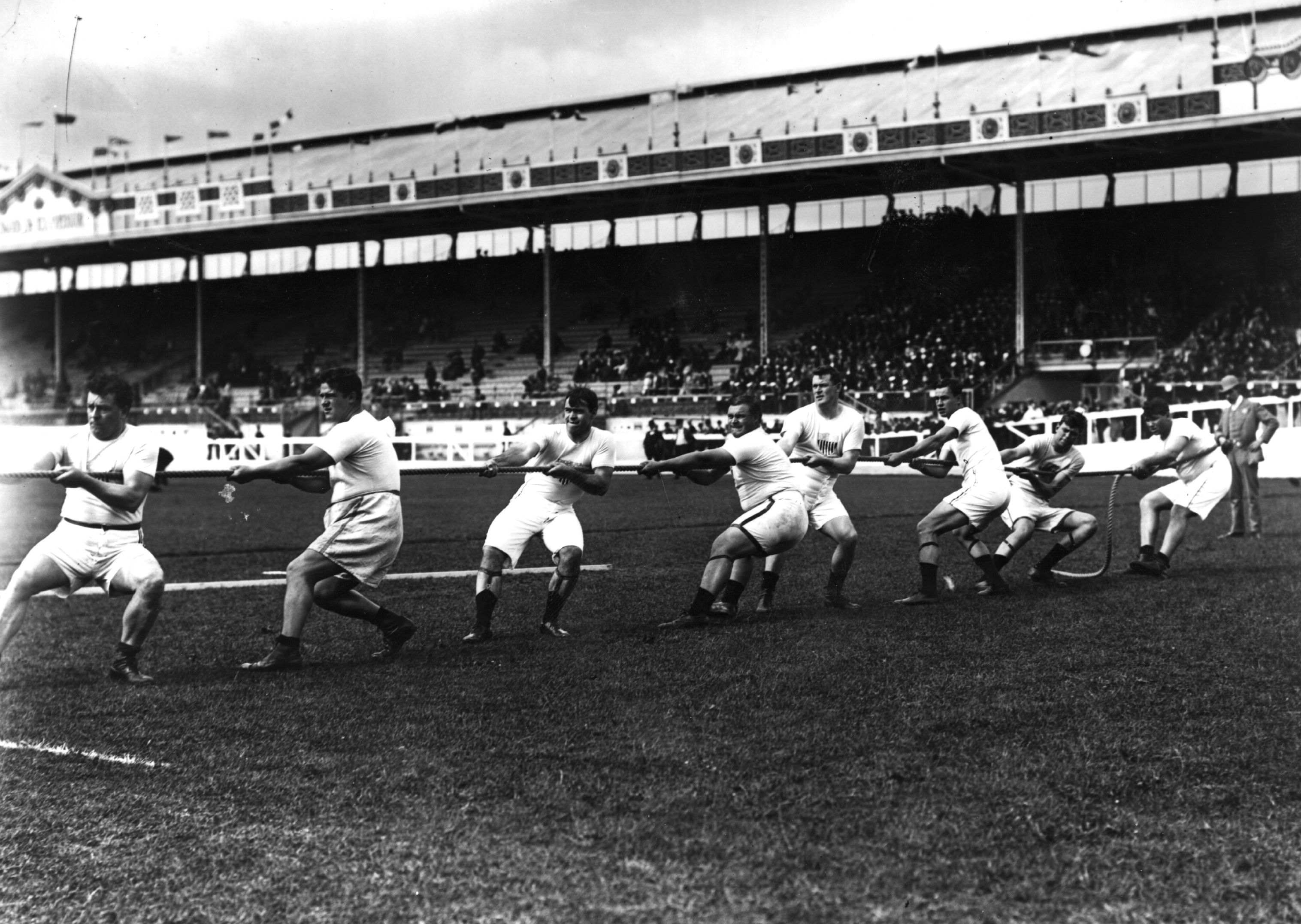You won't believe how crazy these former Olympic events were
Cane fighting. Taxi racing. Bird murdering. And more!


For all the beauty and grace on display, the Olympics are actually pretty weird. Besides running and swimming well, you can get a gold medal for things like race walking, steeplechase, shooting, and even jumping really well on a trampoline. But believe it or not, the Olympics used to be even weirder.
The Paris Games in 1900 were of particular interest to fans of oddball sports — there were lots of wacky demonstration sports being played because the Games coincided with the World's Fair (the 1900 Paris Olympics were also the first year that women were allowed to compete in the Games).
But in the modern Olympics' 120-year history, there have been plenty of other chances for bizarre sports to show up on the international stage. Read about some of the strangest to have ever been played, below.
The Week
Escape your echo chamber. Get the facts behind the news, plus analysis from multiple perspectives.

Sign up for The Week's Free Newsletters
From our morning news briefing to a weekly Good News Newsletter, get the best of The Week delivered directly to your inbox.
From our morning news briefing to a weekly Good News Newsletter, get the best of The Week delivered directly to your inbox.
1. Live pigeon shooting
Reigning champion: Leon de Lunden (Belgium)
Last played: 1900
Apparently between 300 and 400 birds were shot out of the sky for this event, which made its first and only appearance at the 1900 Olympics. Today, they use clay targets that are mechanically flung into the air, rather than, you know, actual living animals.
A free daily email with the biggest news stories of the day – and the best features from TheWeek.com
2. Cane fighting
Reigning champion: Beauduin (France)
Last played: 1924
Canne de combat was preformed as a demonstration sport at the 1924 Olympics. Yes, it is exactly what it sounds like — people whacking each other with canes.
3. Greek-sailors-only swim (100 meter)
Reigning champion: Ioannis Malokinis (Greece)
Last played: 1896
You know a good way to rake in a bunch of Olympic medals for your country? Host an event only open to your own nationality. The men's sailors 100-meter freestyle swim in 1896 was only open to sailors in the Greek Royal Navy; apparently this was totally fine with Olympic organizers, although historian Bill Mallon called "its inclusion in the Olympic records dubious at best."
4. Firefighting
Reigning champion (professional): Kansas City (USA)
Last played: 1900
Both professional and volunteer firefighters played in the unofficial firefighting competition at the 1900 Olympics, although individuals didn't fight the fires — cities did. Kansas City, Missouri, earned the professional gold medal. Apparently Kansas City was kind of the firefighting champions of the world at the time; resident firefighting legend George C. Hale patented "more than 60 firefighting inventions," Missouri Valley Special Collections writes. "He was also chosen to represent the United States in an international fire exhibit in London in 1893. In front of the lord mayor and royalty, Hale led the Kansas City Fire Department to a first-place victory." Kansas City didn't disappoint in Paris, either.
5. Swimming obstacle course (200 meter)
Reigning champion: Frederick Lane (Australia)
Last played: 1900
You know what makes swimming even more exciting? Swimming with obstacles in the way. That is what some sharp Frenchman figured out back in 1900, when 12 swimmers from five nations competed by swimming under and climbing over rows of boats. There is probably a good reason this sport got discontinued, but it must have been thrilling to watch.
6. Tug-of-war
Reigning champion: Great Britain
Last played: 1920
Everybody's favorite childhood game of brute force was included in the Olympics between 1900 and 1920. Apparently people miss it, because the Tug of War International Federation applied for their sport to be included in the 2020 Olympics. It didn't end up making it this time around, but here's to hoping for 2024!
7. Motor boating (40 nautical miles)
Reigning champion: Emile Thubron on the Camille (France)
Last played: 1908
Motor boating is probably one of the less athletic sports to ever make it into the Olympics, which is likely why it was included one time and one time only, way back in 1908 (it was also demonstrated in 1900). But with the sport played on turn-of-the-century powerboats and in a gale, the whole spectacle sounds like it still managed to be quite the show:
Just before the start, Daimler II. showed a fine burst of speed, but just as the five-minute gun fired she developed some trouble, and, after hanging about and cruising at slow speed for some time, she turned and went away down the course without crossing the line. Meanwhile, Wolseley-Siddeley, after waiting for Daimler II., in order to make a race of it, started alone, to be followed, however, shortly afterwards by Camille. Wolseley-Siddeley finished her second round in 18 min. 8 sec., this representing a speed of 26·6 knots, which was as much as could be expected on such a day, and, as she had then nearly lapped 230 Camille, it seemed safe to conclude that the third gold medal would also go to an English-built boat. But it was not to be. The tide was rather past half-ebb, and Wolseley-Siddeley getting too close to Hamble Spit went high and dry on the soft mud, and so eliminated herself from the contest. Daimler II. meanwhile had retired, and so Camille was left to finish alone, which she did at a speed of nearly 18 knots. [...] This finished the racing, which had proved most disappointing from both the record-breaking and spectacular points of view, but which furnished another instance of what can be got out of modern boats when handled with skill, nerve, and determination. [The Fourth Olympiad: London]
8. Rope climbing (8 meter)
Reigning champion: George Eyser (United States)
Last played: 1932
This sport was played exactly like it is in gym class — scramble up the rope as fast as you can (okay, early competitors got points for "style" too, which might have been a finer artistic point overlooked by your P.E. teacher). Perhaps the coolest thing about rope climbing was that the final gold medal went to U.S. gymnast George Eyser, who won with a wooden leg.
9. Underwater swim race
Reigning champion: Charles Devendeville (France)
Last played: 1900
If obstacle-course swimming isn't your cup of tea, then perhaps underwater swimming races are? Athletes got points for how long they stayed underwater; however, the sport was so unpopular that they didn't continue it at the next Olympics. For the record, Devendeville won by swimming 60 meters underwater in 68.4 seconds.
10. Gymnastics on horseback
Gold medal: M. Bouckaert (Belgium)
Last year played: 1920
This odd sport is more commonly known as "vaulting." Riders at the Olympics had to perform moves both with the horse stopped and at a canter, as well as with a saddle and bareback. There have been several attempts to get vaulting included once again in the Olympic Games; it was demonstrated at the 1984 and 1996 Olympics. Nowadays, though, gymnasts simply stick to the pommel horse and the vault for these sorts of feats.
11. Hot air ballooning
Reigning champion: Unknown balloonist (France)
Last played: 1900
How does one compete at hot air ballooning, exactly? Good question — apparently judges at the one and only hot air ballooning Olympic demonstration event gave points to contestants for distance, duration, elevation, and, uh, stopping. Sixty-one men and three women competed for the medals, all of which ultimately went to the French. The event was banned from returning to the Games because it was considered a motorized sport.
12. Taxi and delivery truck racing
Reigning champion: Taxi, unknown driver (France); delivery truck, unknown driver (France)
Last played: 1900
While you might be picturing a New York City yellow cab racing through the streets of Paris, keep in mind this was the turn of the century — cars were a startling new invention (and one can't imagine they actually raced very fast). The 14 vehicles in the race "had to complete a course of 30 km round Vincennes twice a day. Prizes were awarded in four categories, divided by type of car and propulsion," The International Society for Olympic Historians reports.
13. One-handed weight lifting
Reigning champion: Launceston Elliot (Great Britain)
Last played: 1906
If you're only any good at lifting things with one hand, then the inaugural one-handed weight lifting event at the 1896 Olympics were for you. Lifters had to pick up weights with each hand successively, however; second and third place medalists almost tied, except Greece's Alexandros Nikolopoulos failed to lift 57 kg with his other hand, giving a silver to Denmark's Viggo Jensen. The top spot on the podium went to Launceston Elliot of Great Britain, and was the nation's first gold medal ever.
14. Ski ballet
Reigning champion: Men, Fabrice Becker (France); Women, Conny Kissling (Switzerland)
Last played: 1992
Yes, ballet on skis is a thing, and yes, it's as absurd as it sounds. (It is truly better watched than described — trust me, this is a YouTube hole you want to go down). Unfortunately, ballet skiing was short lived at the Olympics — it only made an appearance as a demonstration at the 1988 and 1992 Olympics, and it didn't exactly garner the widespread popularity its proponents might have hoped for. "It was not received well [in 1988], and I would venture to say that from that moment on, it was probably doomed. It didn't do well with TV ratings, it didn't do well with respect to how it was viewed and reviewed. Which is not to say that there wasn't some great ballet skiing that happened," aerialist Jeff Chumas told Grantland in an essential history of the sport.
15. Plunge diving
Reigning champion: William Dickey (USA)
Last played: 1904
There isn't a whole lot of skill involved with this one; basically, you just want to sink as deep as possible when you hit the water (you aren't allowed to wiggle or move in any way to encourage sinking). That is why plunge diving was eventually removed from the Olympics; it ended up depending more on an athlete's weight than, well, talent. "The stylish-stout chaps who go in for this strenuous event merely throw themselves heavily into the water and float along like icebergs in the ship lanes," The New York Times harumphed in 1930. Alas, the event lived and died at the St. Louis Olympics.
Jeva Lange was the executive editor at TheWeek.com. She formerly served as The Week's deputy editor and culture critic. She is also a contributor to Screen Slate, and her writing has appeared in The New York Daily News, The Awl, Vice, and Gothamist, among other publications. Jeva lives in New York City. Follow her on Twitter.




